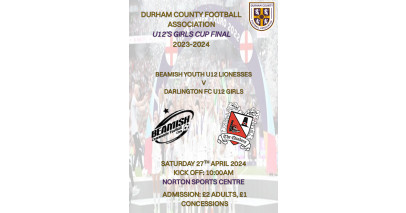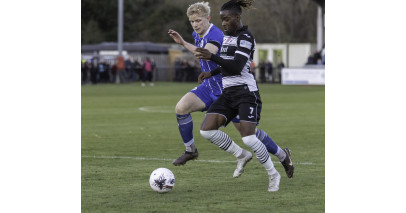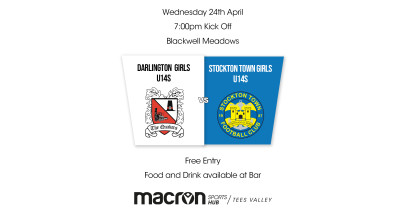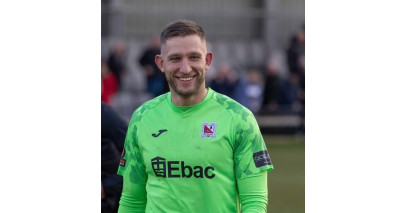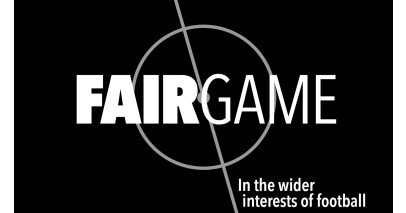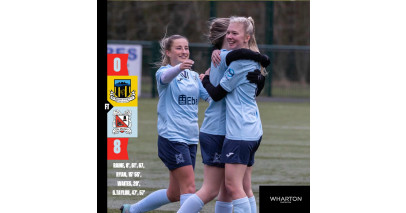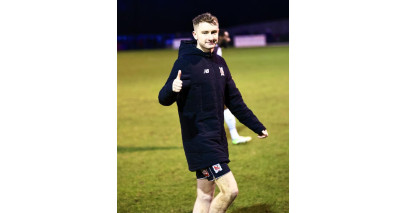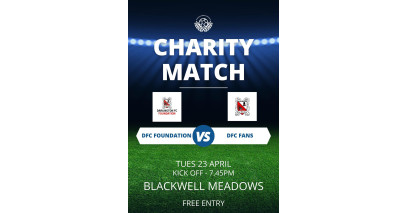Where are they now? Mark Prudhoe
By Ray Simpson

[caption id="attachment_22427" align="alignnone" width="229"] Kevan Smith and Mark Prudhoe with the...
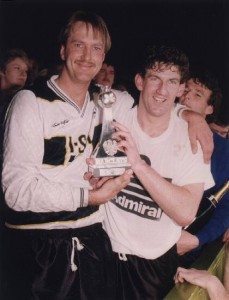 Kevan Smith and Mark Prudhoe with the Division Four championship trophy[/caption]
Kevan Smith and Mark Prudhoe with the Division Four championship trophy[/caption]Mention the best Darlington goalkeepers of all time, and the name of Mark Prudhoe is sure to be near the top of the list, if not at the top.
Mark was the regular man at the back in two of Quakers’ greatest ever seasons, when they won the GM Vauxhall Conference and the old Fourth Division between 1989 and 1991.
Mark was one of Brian Little’s first signings soon after the new manager took over in the middle of March 1989.
“I was at Carlisle, and Alan Ashman, the manager, said that Darlington were looking for a keeper, and would I be interested in joining them.
“I definitely was, because I was desperate to get back to the north east and my family. Stockport were also interested, but I thought that it was time to go home.
“Unfortunately, I was a disaster in my first few games. Brian told me that I was trying too hard, and instead should concentrate on just being a keeper. Brian was a big influence on me.”
Unfortunately, Mark couldn’t prevent Quakers going down to the Conference.
“The pressure on the team then, was the heaviest which I’d ever experienced. We used to go into games, and maybe not enjoy them, and it was very difficult for Brian to motivate us.
“It was a terrible day when we were relegated at Scunthorpe in 1989, but we always felt that we had a very good chance of coming straight back up.
“Brian brought a few players in, and we all gelled together. We were like a bunch of crooks and pirates. Virtually all of us were mavericks – we’d played for a lot of clubs, without winning anything. Most of the lads hadn’t been successful earlier in their careers, and in the Conference, it was probably the first time most of us had a bonus in our pockets.”
There were one or two hairy moments in the Conference, including the so-called Battle of Northwich on a Monday night in March. “I was nearly sliced in half at Northwich. A blood vessel burst in my thigh, and my leg really swelled up. It was a naughty game that one, to say the least.”
Happily, Mark recovered quickly, and regained his place in the side for the run in to the Conference title.
“The game at Welling was always on a knife edge. They had a couple of chances, but I don’t think they ever really troubled us. But when Gary Coatsworth scored, all hell broke loose. It was a massive relief more than anything else to know that we were back in the Football League.
“We had to win promotion that season from the Conference, the future of the club was riding on it. There was a lot of pressure on us that season to get the only promotion spot. It was much tougher than the Football League in that respect – there were three automatic promotion places then, and the play offs had just begun a couple of years before that. But in the Conference, it was either us or Barnet for most of the season, and fortunately we won promotion.”
Quakers kept the momentum going the following season in a never-to-be-forgotten second title win. “We never ever thought that we wouldn’t get promoted from the Fourth Division,” he said.
“The championship was a bonus, but it never entered our minds that we could have finished up in the play offs. All we were thinking about was finishing in the top three.
“We had that little bit of extra belief, which we never had before the Conference. We all gelled together at just the right time, and the team spirit was very good. Brian only bought Mick Tait after we were promoted from the Conference. Mick had a great season, and was voted Player of the Year.”
Unfortunately, it all went wrong the following season after Brian Little left. “Maybe Brian felt that he’d taken the club as far as he could, but the players were confident of making it three out of three. Brian was never really replaced, and he was a tough act for Frank Gray to follow.”
The financial problems worsened in season 1991-92. “We never got paid for five weeks, and one day we held a players’ meeting. David Cork said; “No pay, No play” but Tom Hughes, the chief executive, promised that we would be paid. The following day, we went to Bradford City, and won 1-0!”
Mark was one of the club’s most saleable assets, and sure enough, the club sold him to Stoke City.
“I was gutted, because I didn’t want to leave. I played for the club for four years, and they said they wanted to keep me, but they didn’t offer me anything extra.
“I don’t regret going to Stoke, but it left a bad taste in my mouth. The club eventually got £120,000 for me.”
Mark was voted Player of the Decade by supporters in 1999, and he returned briefly for a month on loan the season after. It was while he was at Stoke that he was loaned out to Peterborough United, Liverpool and York City, and then was transferred to Bradford City and Southend, before ending his playing career at Macclesfield. He even had a brief spell on loan with Darlo again when there was a keeper crisis, but didn’t play. All in all, he played for 16 clubs in his career, with 19 transfers along the way (he played for some clubs twice). In an interview in 2005 when he was a freelance goalkeeping coach, he reckoned that he’d worked with 56 managers until that point!
Mark has been just as busy in his coaching career as he was in his playing career. After working as a freelance goalkeeping coach for several years travelling around the clubs, he joined Hull City when his old friend Phil Brown was manager – you would often see him in the dugout on tv – and then he took on a similar role on his doorstep at Sunderland, where his football career began over 30 years ago.
“I thought it was time to stop travelling all over the country, and stay at home every night. But I had to look around the country for work in order to stay in the game, because football was all I knew, and that’s why I travelled from Southend to Macclesfield to Stockport to Grimsby and loads of other places. When I was a freelance coach, I would be in Doncaster on a morning, and then maybe Huddersfield in the afternoon, and then Carlisle first thing the next morning.
“It was quite difficult at times to find work in football, but I was prepared to travel.”
He’s now an integral part of the Premiership club’s set up. When we caught up with him, he was on his way back with Sunderland under 21s from a game at Chelsea.
“I work with all the keepers at the club, from Under 7s all the way through to Under 21s, seven days a week. If I come across some really good ones in our Academy, I have no hesitation in pushing them forward.”
One goalkeeper he knows plenty about is Jordan Pickford, who had a spell at Quakers during that infamous 2011-12 season.
“Jordan was thrown in at the deep end at Darlington that season, it was a sink or swim situation. And look at what he’s done since then, when he’s been out on loan. He’s progressed year on year, playing at Burton, Carlisle United, Bradford City and now Preston North End.”
Mark attended the reunion in the Dolphin Centre to launch “Darlo’s on the Up” and he was given a huge cheer as he was introduced and walked into the hall.
Clearly, those of us who could remember that far back, could recall several fantastic displays by him, including that game in the mud at Hartlepool when he denied the home side single-handed – justifying his position as the club’s best ever keeper.




